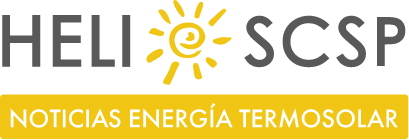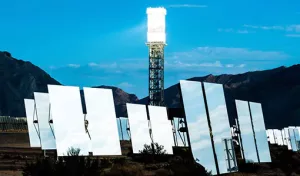Heliostat Consortium Unveils Funding Awards to Facilitate Affordable and Accessible Heliostat Deployment
The Heliostat Consortium, led by the National Renewable Energy Laboratory and Sandia National Laboratories, has announced seven awardees from a request for proposals aimed at reducing the cost of heliostats and creating new market opportunities for the industry. Heliostats are mirrors that track the sun to reflect concentrated sunlight to a receiver, where it can be stored as heat for long-duration energy storage and converted into electricity. Low-cost heliostats offer significant renewable energy potential and enable 5 cents per kWh concentrating solar-thermal power with energy storage capacity of 12 or more hours.
The Heliostat Consortium, led by the National Renewable Energy Laboratory and Sandia National Laboratories, has announced seven awardees from a request for proposals aimed at reducing the cost of heliostats and creating new market opportunities for the industry. Heliostats are mirrors that track the sun to reflect concentrated sunlight to a receiver, where it can be stored as heat for long-duration energy storage and converted into electricity. Low-cost heliostats offer significant renewable energy potential and enable 5 cents per kWh concentrating solar-thermal power with energy storage capacity of 12 or more hours. The seven projects selected will receive $3.5 million in funding.
According to a report from NREL, the Heliostat Consortium, co-led by NREL and Sandia National Laboratories, has announced seven awardees from a request for proposals aimed at achieving the Department of Energy’s (DOE) goals for heliostat cost reduction, sustained multifaceted innovation, and improved solar field performance.
Heliostats are mirrors that track the sun to reflect highly concentrated sunlight to a receiver, where it can be stored as heat for long-duration energy storage and converted into electricity. Projects from this solicitation, which will be implemented over the next 1-3 years, will focus on lowering the cost of heliostats and heliostat technologies and creating new market opportunities for the heliostat industry.
Low-cost heliostats offer significant renewable energy potential. They enable 5 cents per kWh concentrating solar-thermal power with energy storage capacity of 12 or more hours, which would help to support a fully decarbonized electricity grid. The expansion of low-cost, quality-built heliostats will reduce emissions in greenhouse-gas-heavy industries by providing needed high-temperature thermal energy. The projects that result from this RFP would significantly enhance the country’s ability to hit 2050 targets for energy sector decarbonization.
“These projects address a broad range of needs in the heliostat and concentrating solar power community,” said Guangdong Zhu, Heliostat Consortium (HelioCon) executive director and NREL senior researcher and group manager of thermal energy systems. “They range from design and manufacturing, automation, wireless controls, and education and outreach that will create course materials for students, graduate students, and even people already working in the heliostat industry.”
1. Heliostat Design Optimization through Machine Learning and Additive Manufacturing: This project aims to develop a new design optimization approach using machine learning and additive manufacturing.
2. Low-Cost, High-Performance Heliostat Manufacturing: This project aims to develop a low-cost, high-performance heliostat manufacturing process for the solar power industry.
3. Smart Heliostat with Wireless Control and Monitoring: This project aims to develop a smart heliostat with wireless control and monitoring that can be remotely controlled and monitored.
4. Heliostat Automation and Control System: This project aims to develop an automation and control system for heliostats to reduce the cost of operation and maintenance.
5. Heliostat Outreach and Education: This project aims to develop a curriculum for students, graduate students, and people already working in the heliostat industry.
6. Heliostat Manufacturing Training: This project aims to develop a training program for heliostat manufacturing to help create a skilled workforce for the heliostat industry.
7. Novel Heliostat Design and Manufacturing for Improved Performance and Lower Cost: This project aims to develop a novel heliostat design and manufacturing process for improved performance and lower cost.
To bring everything full circle, the Heliostat Consortium’s announcement of funding awards is a significant step towards achieving the DOE’s goals for heliostat cost reduction, sustained multifaceted innovation, and improved solar field performance. The seven projects selected will help to create new market opportunities for the heliostat industry and significantly enhance the country’s ability to hit 2050 targets for energy sector decarbonization.
This article covers «Heliostat Consortium Unveils Funding Awards to Facilitate Affordable and Accessible Heliostat Deployment», in Technology News.



